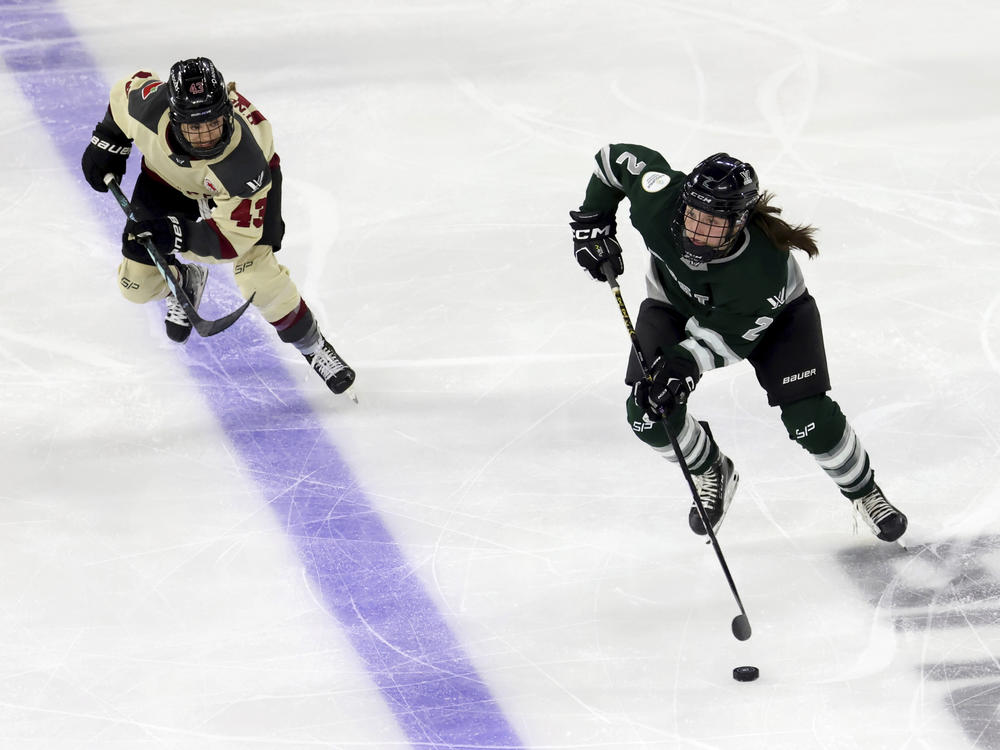Section Branding
Header Content
Why women's pro hockey may be here to stay — and how you can stream playoffs for free
Primary Content
The Professional Women's Hockey League has taken the sports world by storm, setting domestic and global attendance records in its inaugural season.
The success has left players and fans with high hopes that the concentration of talent in the league paired with a long-term business plan means professional women's hockey is here to stay.
The cross-border league with six teams across the U.S. and Canada was officially founded in the summer of 2023 and started play in January of this year.
"The league this season has set six different attendance records, including a world record for attendance at a women's pro hockey game or women's hockey game, period, with over 21,000 fans at a game. In Montreal, they have over 40 corporate partnerships, over 5,000 fans on average across all 72 games this season. And the games have been really good. The product is great," Hailey Salvian, who covers women's hockey for The Athletic, told NPR.
Toronto, Montreal, Boston and Minnesota qualified for the playoffs after a highly competitive regular season. Only Ottawa and New York missed out. Each best-of-five semifinal round features a U.S.-Canadian matchup. Boston has already punched its ticket to the final after beating Montreal in three straight games. In the second semifinal, Toronto leads Minnesota 2-1, with game four scheduled for tonight.
The PWHL is the latest edition of a professional women's hockey league in either the U.S. or Canada.
The Premier Hockey Federation, which was established as the National Women's Hockey League in 2015, ceased operations after eight seasons last year. But Salvian believes that the PWHL is standing on a more solid foundation than its predecessors.
"Without getting into the complicated, decadeslong history of women's professional hockey, I think the easiest way [to break it down is that] for a long time, the talent pool was divided between different leagues and associations. Players were just playing in a lot of different places. And now with the PWHL, all the best players are in one spot, which has allowed all the sponsors, all the fans, all the eyeballs to watch this one league, which has made for a better product and, of course, a better business," she said.
The league and all of its six teams are owned by the Mark Walter Group. The American billionaire businessman has experience owning and operating sports properties. He's the owner of Major League Baseball's Los Angeles Dodgers and a part owner of Chelsea FC in the English Premier League.
Salvian thinks that this strong financial backing, which also includes tennis legend Billie Jean King, may help the league succeed where others didn't. Under the collective bargaining agreement between the league and the player's association, the minimum salary for players is $35,000 per season, while star players can earn six figures.
The success of the PWHL's first season comes at a boom time for women's sports in North America.
The WNBA season kicked off this week, where college basketball star Caitlin Clark is trying to make her mark with the Indiana Fever. The league is set to expand over the next couple of years from 12 to 14 teams. And on the soccer side, the NWSL is setting new valuation records for its franchises.
As the first PWHL season draws to a close, the question remains whether it can replicate and even build on the success of its first season. One aspect that is crucial to the viability of all sports leagues is signing a lucrative broadcast rights deal. To show cable and broadcast networks like ESPN, TNT or NBC that women's hockey is a worthwhile investment, the PWHL decided to stream its games for free on YouTube this year.
"I think it's really smart for the league to have all these eyeballs coming to their YouTube, as well as their regional TV ratings, so that next time or the time when they're able to get a more traditional TV rights deal, they can have some numbers to bring to the table," Salvian said.
As for the lack of team nicknames and identities yet, the league decided that due to time constraints in getting everything up and running it would forgo creating specific identities around the franchises until after the inaugural season.
Game four of the semifinal series between Toronto and Minnesota is scheduled for Wednesday at 8 p.m. Eastern and can be streamed right here:

